In this detailed post, we review Animal Welfare League’s activities in 2023 and outline our plans for the years ahead. This effort is part of our commitment to knowledge sharing and transparency, providing our partners, donors, and funders with an opportunity to understand our accomplishments, challenges, and strategic decisions and provide feedback.
Snapshot of AWL’s 2023
- We secured two 100% cage-free commitments in Ghana from Koforidua Guest’s Hotel and Grovenest Inn, impacting an estimated 10,000 hens by 2025.
- We conducted three egg producer workshops in the Greater Accra, Ashanti, and Eastern regions, bringing together over 132 producers. 93 of whom joined the National Cage-Free Farmers Network, with 33 currently listed in the Directory. This enabled over 350,000 hens, as reported by the 93 egg producers as their current production, to be committed to cage-free housing that upholds our minimum welfare standards.
- We participated in one television and one radio interview on topics related to animal welfare, with local coverage in the Ashanti region for the radio station and national coverage for the TV station. Additionally, we recruited and trained 25 volunteers from across the country onto our Volunteer Program. These volunteers took over 150 social media actions on Linkedin, Facebook, Instagram and X (formerly Twitter) on animal welfare topics, including the OWA Africa Pick n Pay Campaign with over 12,000 impressions.
- “Y3 Dawase”, which is “thank you” in Ghanaian Twi, to everyone who supported and engaged us in our work in the previous year. For non-casual readers who want to indulge us can read more for the details below.
About Animal Welfare League (AWL)
Animal Welfare League is committed to enhancing animal welfare in Ghana, encompassing farmed, aquatic, and wild animals, among others. We strive to fulfil our mission through meticulously designed projects, research initiatives, and community outreach, collaborating with stakeholders, communities, and the government. We have been running our spearheaded project on farmed animal welfare called Cage-Free Project with specific research initiatives, and through volunteers, we conduct community outreach programs.
Our work in 2023
Cage-free Project
We employ a four-pronged strategy consisting of corporate campaigns, engagement with egg producers, raising consumer awareness, and sequentially advocating for policy to alleviate the suffering of hens in Ghana and across Africa.
Corporate Engagement
We have established a dynamic database of targeted companies based on egg usage estimates, star categorization, and regional distribution, which currently includes 16 hospitality companies across five regions in Ghana. In 2023, we conducted 16 physical outreach initiatives and held 27 meetings with companies. As a result, two companies committed to transitioning to 100% cage-free sourcing. These two commitments spurred advancements toward cage-free production among their suppliers, that will impact over 10,000 hens by 2025. We then positioned ourselves for future growth by securing corporate training with Amy Odene from UserFriendly. This valuable training program officially commenced in 2024, and will equip us with the skills needed to effectively scale our local and regional cage-free commitments.
Additionally, we initiated collaboration with the Ghana Hotels Association, the premier association of hoteliers in Ghana, boasting over 600 members. In partnership with Animal Advocacy Africa and the Open Wing Alliance, we collaborated with Sibanye Animal Welfare and Education for African Animals Welfare to produce an article and webinar exploring the unique strategies for conducting cage-free campaigns in Africa.
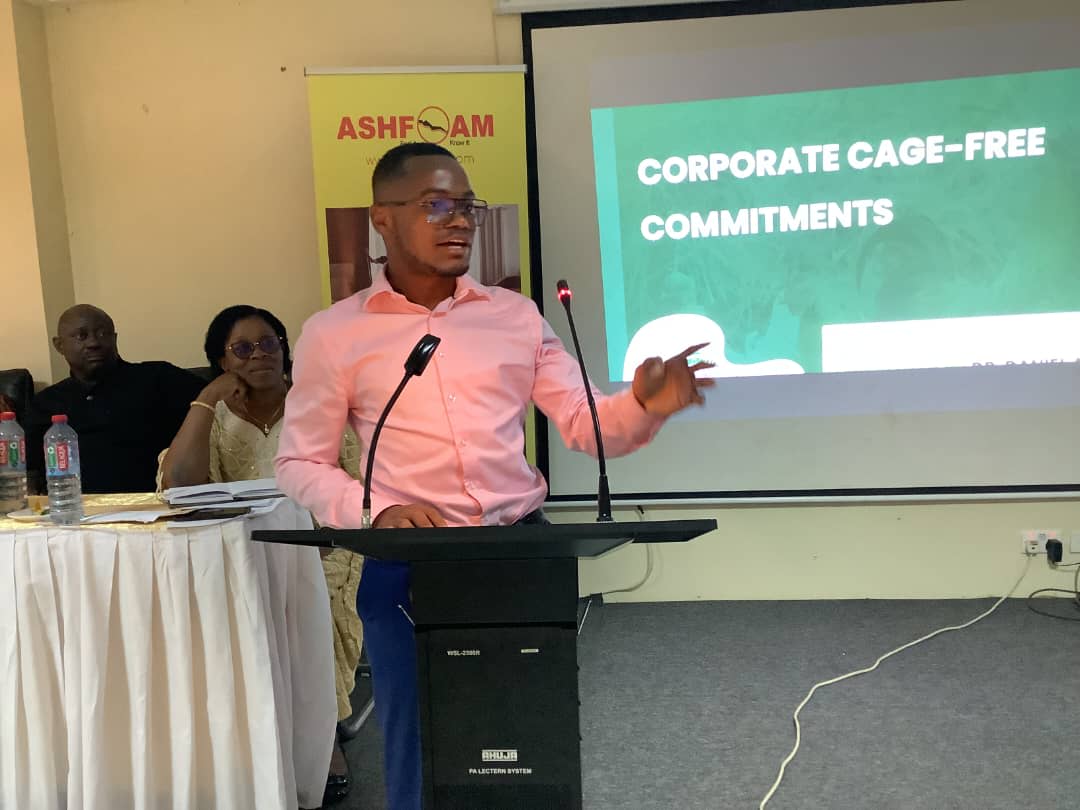
Egg Producer Engagement
Under this arm, we organized three workshops targeting poultry farmers in Ghana's key poultry production zones. These workshops convened over 132 egg producers from the Greater Accra, Eastern, and Ashanti regions. Among them, 93 egg producers joined AWL’s National Cage-Free Farmers Network, with 33 successfully certified to be listed in our National Cage-Free Directory. The commitments made by these 93 egg producers resulted in the assurance of cage-free housing for over 350,000 layers, reflecting the reported production figures at that time. As part of their involvement in the network, egg producers agreed to uphold our minimum welfare standards including the following terms:
- Abstaining from the use of battery cages or similar practices in production
- Accepting both announced and unannounced farm visits
- Providing periodic updates on production to AWL
- Allowing AWL to share data with companies
Furthermore, three staff members completed the Cage-Free Egg Production online modules provided by Global Food Partners. This served as an initial step in staff training on cage-free egg production, aligning with our ongoing efforts to facilitate access to training on cage-free egg production for animal advocates and egg producers across Africa.
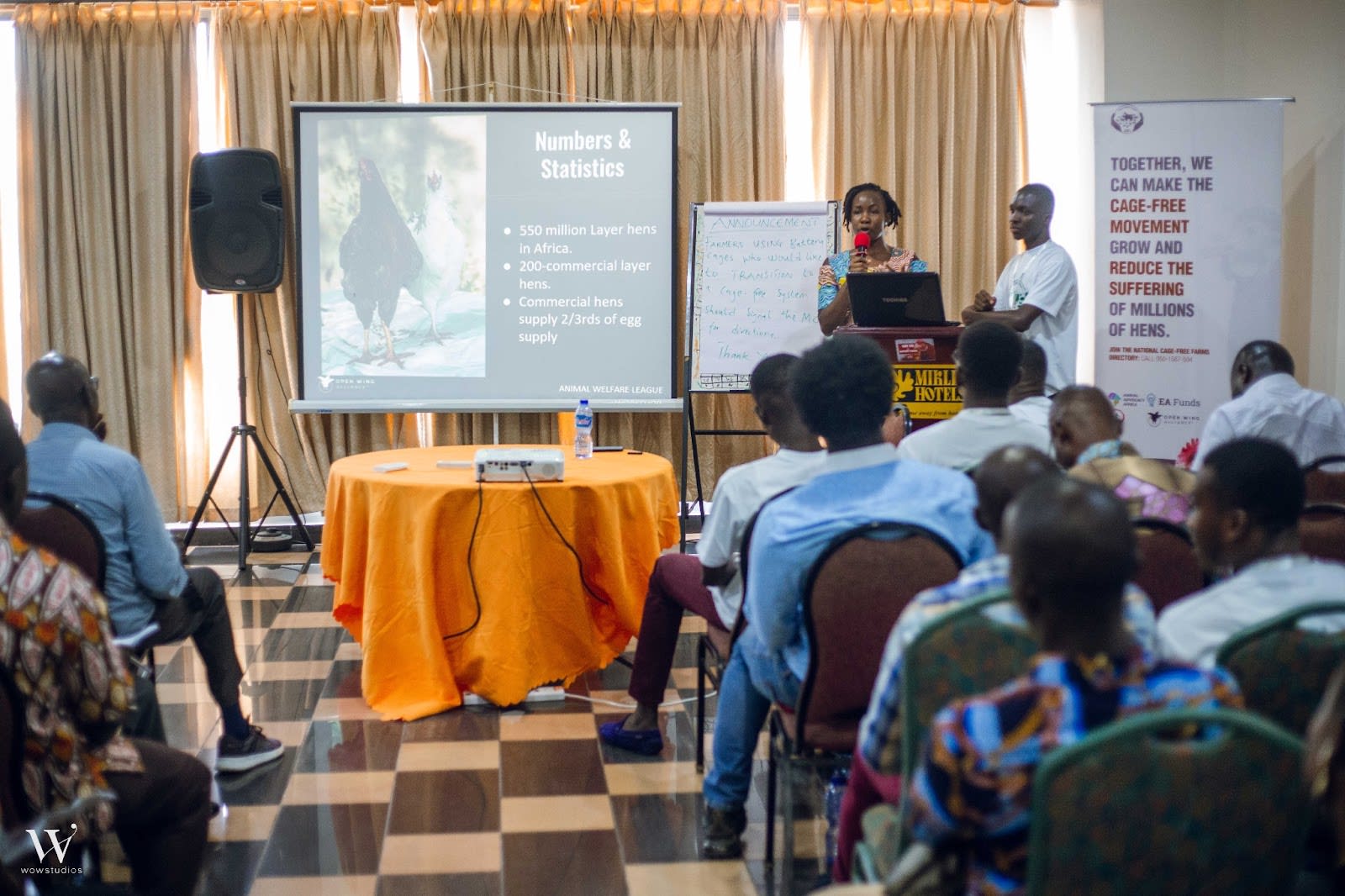
We also conducted farm visits to egg producers who joined the National Cage-Free Farmers Network and Directory. These visits enable us to assess husbandry practices, provide veterinary consultations, and collect farm data. Additionally, we guide farm owners and workers through our rigorous onboarding process and expectations, while also addressing their personalized challenges.
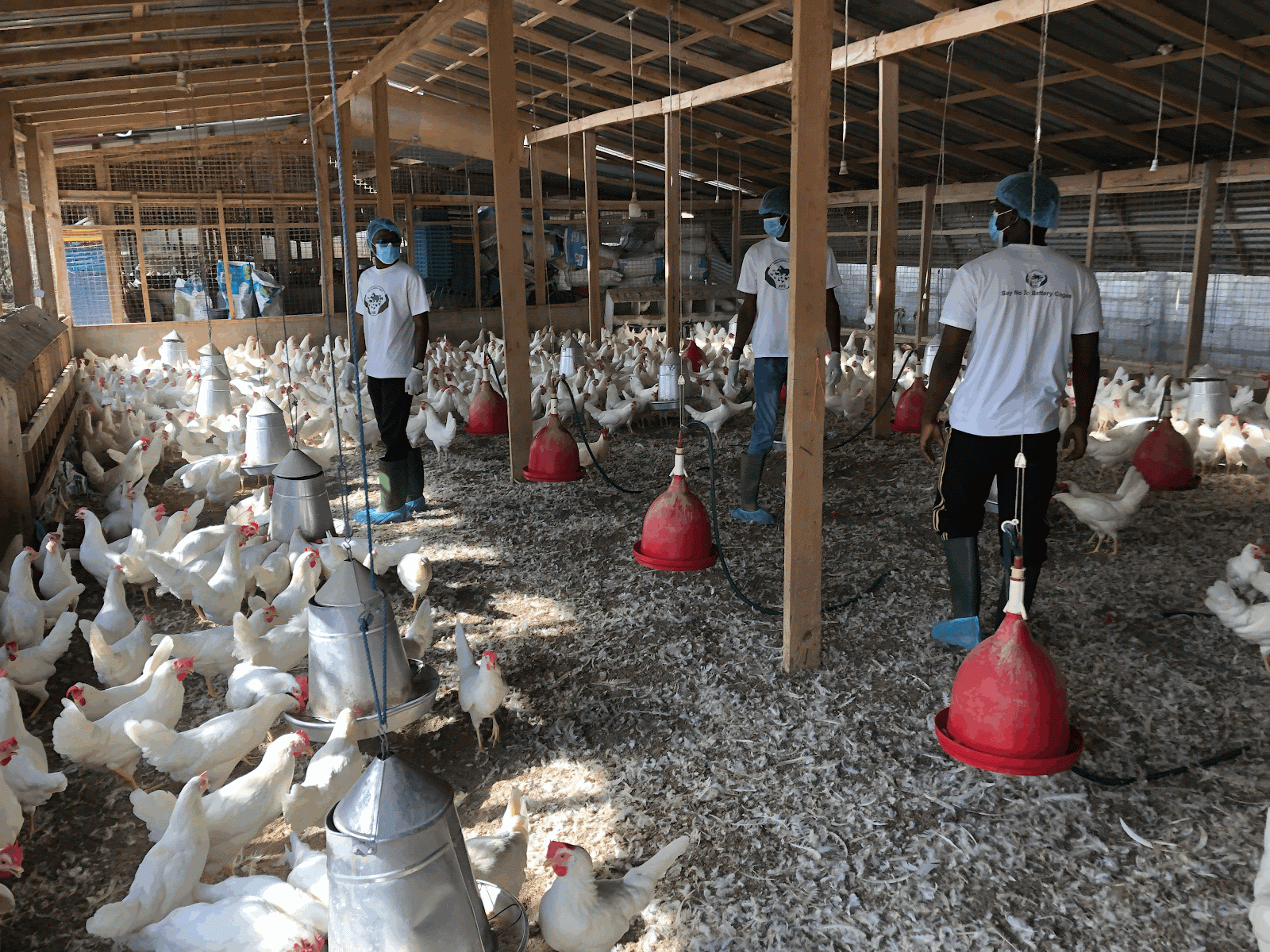
Consumers
Recognising the critical need to address animal welfare issues considering the high level of neglect in Ghana, we prioritise raising consumer awareness, and so we broadcasted the egg producers' workshops on multiple television channels, including Joy News, Citi Radio, TV3, and Onua TV. Additionally, we conducted interviews on Oyerepa TV, AIT TV, and Focus FM stations to raise public awareness about the mistreatment and welfare issues faced by hens in factory farming. Furthermore, we recruited and provided training to 25 volunteers, increasing the total number of volunteers supporting animal welfare digital activism to 36. These volunteers collectively reported over 150 social media actions, generating over 12,000 impressions across Facebook, Instagram, LinkedIn and Twitter.
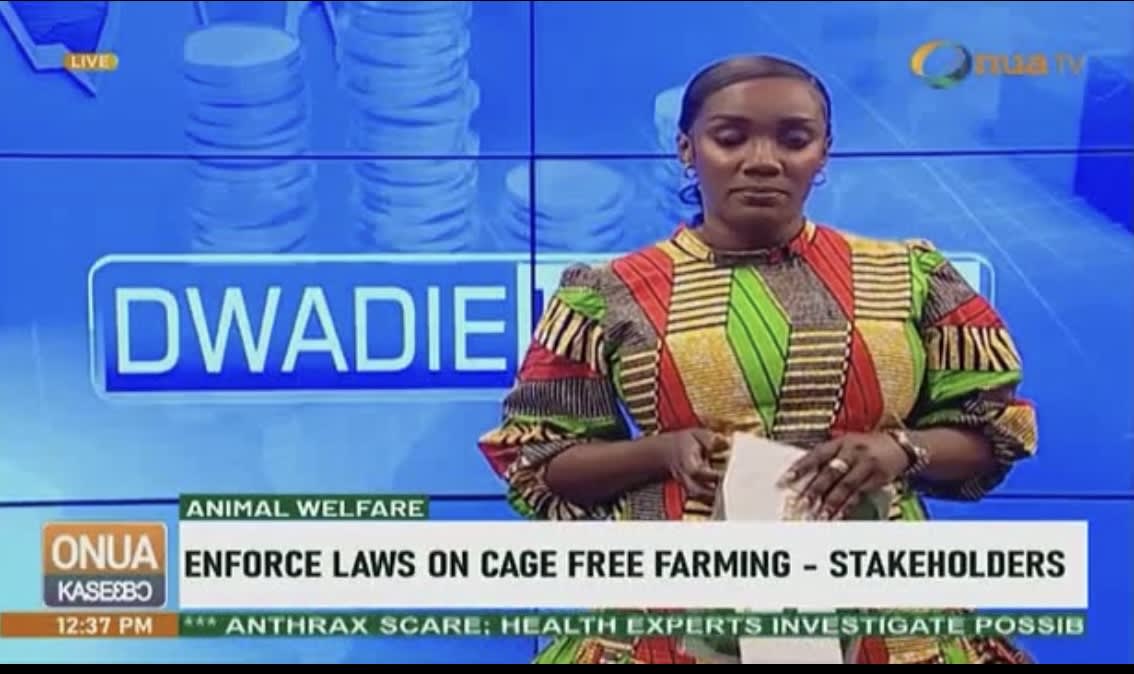
Policy
The Veterinary Council of Ghana extended an invitation to the Animal Welfare League to partake in a stakeholder consultation regarding a proposed amendment to the Veterinary Surgeons Law. One component of this proposed amendment involves the formation of an Animal Welfare Committee aimed at tackling animal welfare concerns within Ghana. Even though the process is in the early stages, Animal Welfare League remains committed to advocating for legislation that protects animal welfare.
OWA Africa
Throughout 2023, we spearheaded the outreach efforts of the Open Wing Alliance Africa organizations to engage with global companies operating in Africa, advocating for global commitments to cage-free practices and regional reporting for their operations within the continent. This entailed conducting outreach to a subset of companies, including Cargill, Nestle, Barry Callebaut, Accor Group, and others, among the 47 targeted companies in 2023. Our objective was to promote accountability and transparency through the implementation of cage-free policies in their operations within Africa.
Community Outreach
Rabies vaccination
In reaction to the culling of dogs suspected of being rabid, we collaborated with the Volta Regional Department of the Veterinary Services Directorate to administer free rabies vaccinations for pets in four communities (Bagble, Ando, Etoe and Gbogame) within the Ho Municipality in the Volta region of Ghana. This vaccination initiative, conducted subsequent to the veterinary department's community sensitization campaigns, resulted in the vaccination of 198 pets (comprising 124 dogs and 74 cats) against rabies.
Dog vaccination against rabies at Bagble, Volta region, Ghana in 2023
Research
Economic Analysis of Poultry Production Systems in Ghana: Cage-Free vs Battery Cages
This study is underway with initial funding from the Tiny Beam Fund. We have engaged two academic researchers from Kwame Nkrumah University of Science and Technology to conduct a thorough examination of the Ghanaian poultry industry. The aim is to gather comprehensive economic data on both battery cage and cage-free systems, facilitating a direct comparison between the two. Additionally, the study will estimate the costs associated with transitioning from caged to cage-free systems in Africa.
Awareness, Attitude and Knowledge of Animal Welfare Among School Children in Ghana:
We have conducted preliminary research involving over 1,600 pupils from sixteen schools across eight regions in Ghana. The aim was to assess the awareness, attitudes, and knowledge of school children regarding animal welfare. This information will be used to inform our humane education project. The report summarising the findings of the research this year.
Programs, Conferences & Events
- In 2023, we participated in a total of four conferences and three other events, including
- AVA US 2023
- OWA Africa Summit 2023
- ANAW West Africa Cage-Free Chicken Conference 2023
- Lead for Animals 2023
- EAG Virtual 2023
- EAG Boston 2023
- We contributed two articles to the EA Forum, authored one article for the ACE blog, and received mentions in several newsletters, including those from Impactful Animal Advocacy, Open Wing Alliance, and Animal Advocacy Africa.
- We were accepted into the inaugural Monitoring, Evaluation, and Learning program hosted by Mission Motor, with the participation of two of our staff members.
- We were accepted into the inaugural Advocate Training program organised by Animal Advocacy Africa, with the participation of one staff member and one volunteer.
- We established a fiscal sponsorship with A Well-Fed World for lump-sum donations in the US
- We secured a partnership with Scarlet Spark for a leadership training program for our staff, scheduled to take place in the second quarter of 2024
- We joined the AMR Multi-Stakeholder Partnership Platform led by the Quadripartite organisations as a civil society organisation stakeholder from Ghana.
Dr. Richard Dogbatse, Community Affairs at AWL speaking at ANAW West Africa Cage-Free Chicken Conference 2023.
Things We Would Like to See Happening in Africa
We are interested in seeing more research on economics and financial aspects, government and policy, consumption and demand, and long-term public awareness interventions. Specifically:
- We would like to see research on developing effective mass media awareness campaigns in African countries.
- What kinds of strategies and messaging would convince decision-makers at public institutions in Africa to reduce the proportion of animal-based food products served at their facilities and events?
- Conduct review of national legislation on animal welfare and national food standards of animal products to identify policy and enforcement gaps.
- How much funding is coming from international donors and intergovernmental organisations to further intensify industrial animal agriculture in Africa?
- What are the biggest welfare issues for farmed fish in semi-intensive farming systems in Africa?
- We would like to see training and support programs specifically dedicated to farmed animal advocacy in Africa. Specifically, we are interested in seeing training on cage-free egg production for advocates, egg producers, and policymakers, as previously outlined in "Why Africa Needs A Cage-Free Model Farm." Additionally, we are keen on seeing training and support on fundraising, project management, monitoring, and evaluation, among other topics discussed more regularly. We aim to see more organisations like our partner Animal Advocacy Africa.
We would like to see more conscious efforts in movement building within the continent, particularly in the effective animal advocacy space. We aim to see a greater number of regional events and conferences focused on advancing the movement in Africa.
We would like to see more concerted efforts to support knowledge sharing within the movement in Africa. While this goal can be addressed through previous initiatives mentioned, we believe that focusing on cultivating the habit and establishing appropriate avenues for knowledge sharing within the region is of utmost importance.
Our Goals for 2024
Cage-free Project
- On corporations, we expect to expand our scope to include restaurants and secure at least three cage-free commitments. As one of the newly appointed strategic leaders, we aim to collaborate closely with OWA Africa organisations on Africa campaigns with the goal of getting at least one country-level reporting of Kempinski hotels cage-free progress in Africa as well as initiate the development of an accountability tool.
- On egg producers, we intend to conduct two regional workshops in high poultry production zones in Ghana, with the goal of admitting at least 80 more egg producers into our Network and Directory impacting at least 200,000 hens per year. Additionally, we plan to update our strategy to incorporate distributors into this aspect of our work.
- On consumers, We aim to conduct mass media awareness campaigns utilising popular television and radio stations in Ghana.
- On policy, We aim to continue our active engagement as stakeholders on animal welfare-related policies in Ghana as well as conducting research in collaboration with other organisations.
Community Outreach
- We expect to establish university clubs under our volunteer program.
- We aim to support the integration and transition from animal agriculture to plant-based agriculture among smallholder farmers.
- We plan to introduce guest blog invitations for content that aligns with our interests.
Research
- We aim to release all research reports and disseminate the findings to the appropriate stakeholders.
- We aim to collaborate with Animal Ask to conduct research on animal welfare policies and legislation in Ghana.
- We plan to introduce essay contests, inviting submissions on specific topics regarding farmed animal welfare in Africa.
Organisation
Budget and financial information
In 2023, our total expenses amounted to USD 51,967. The majority of our funding continued to be sourced from philanthropic funds and contributions from individual donors, with a significant portion coming from multiple individuals within the effective altruism and animal welfare/rights movements.
Our staff and operations
In 2023, we had four staff members who received regular compensation, and we added a new member in December 2023 to handle communications. Due to the fact that over 80% of funds raised in 2023 were directed toward project activities, we were only to provide stipends instead of salaried wages. We are actively fundraising in 2024 to be able to pay our staff competitive salaries.
Mistakes
- We delayed transitioning to other components of our physical outreach strategy, such as networking and collaborating with industry groups, to allow more time for feedback on the physical pop-ins at company facilities. However, we promptly addressed this in the last quarter of 2023 and began collaborating with the Ghana Hotels Association on corporate commitments.
- Feedback from the first workshop in the Greater Accra region indicated dissatisfaction with the duration of the workshop. A postmortem analysis of the workshop also highlighted the importance of travelling to workshop venues well in advance and hiring local dialect translators. We have since implemented these changes and will continue to make adaptations based on feedback.
- We raised a significant amount of funds primarily for project activities, with limited funds allocated for overhead costs. During our annual retrospective and planning meeting, all staff identified compensation as an area for improvement.
How you can help
- We invite funders, donors, organisations, and researchers to support, collaborate with, and enable our work to prevent the suffering of millions of farmed animals in Ghana and across Africa. Currently, we have a funding gap of $46,500, despite having fundraised over 80% of our budget for 2024. You can support us by making a tax-deductible donation in the US to our fiscal sponsor, A Well-Fed World, or through the Animal Advocacy Africa Regranting Program.
- We are a very young organisation and operate in a geographical location with unique and diverse challenges. We always appreciate an opportunity to improve and achieve a bigger impact; hence, if you see flaws in our thinking or planning, please reach out. We always strive to do better.
- If you haven’t already, you can sign up to our newsletter or follow us on social media (LinkedIn and Instagram) to stay up to date about our progress.
- If you haven't already, you can sign up for our newsletter or follow us on social media (LinkedIn and Instagram) to stay up-to-date about our progress.
Y3 Dawase (“Thank You” in Ghanaian Twi)
We extend a big thank you to everyone who enabled us to make progress in our work and achieve the impacts we have made. In particular, this includes our donors, advisors, and our friends and family who support us in working for this cause. Some listed below
- Animal Advocacy Africa
- School of Veterinary Medicine - KNUST
- Ghana National Association of Poultry Farmers
- Open Wing Alliance
- Sharpen Strategy
- Mercy for Animals
- Haven King-Nobles & Friends
- Ghana Hotels Association
- The Motor Mission
- The Ribon
We value the contributions of everyone who has been in contact with us regarding our work and apologise for not including your name here as we cannot list everyone's name.


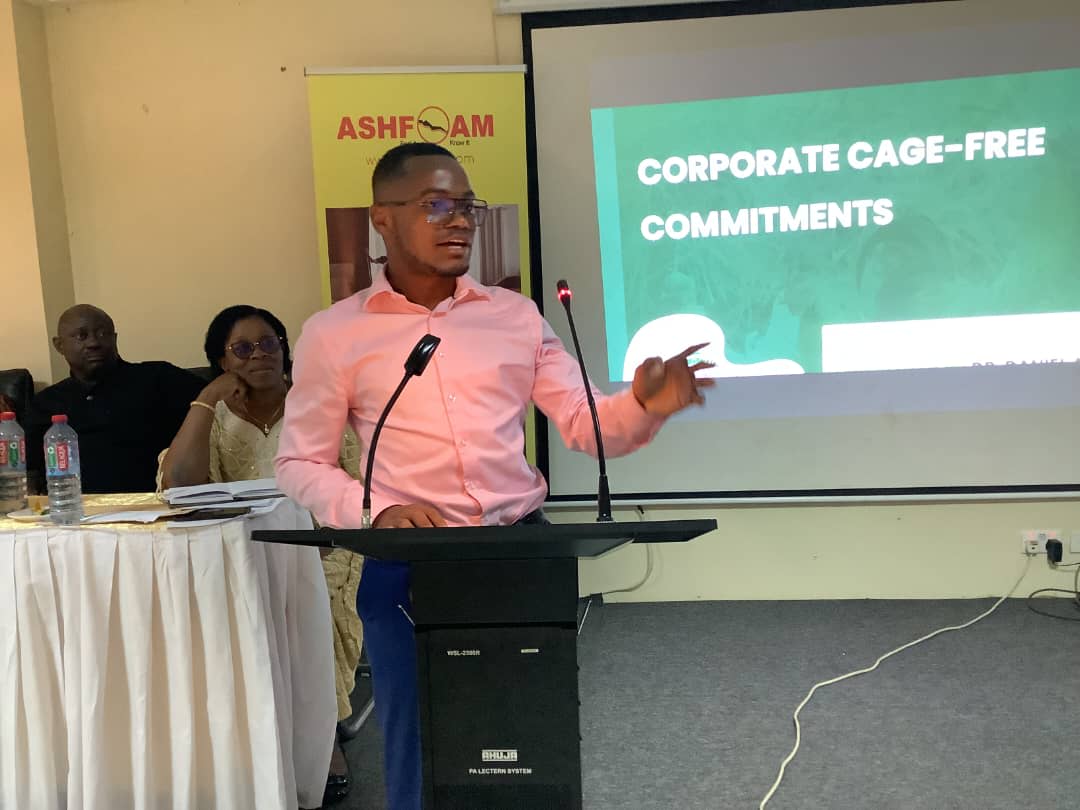
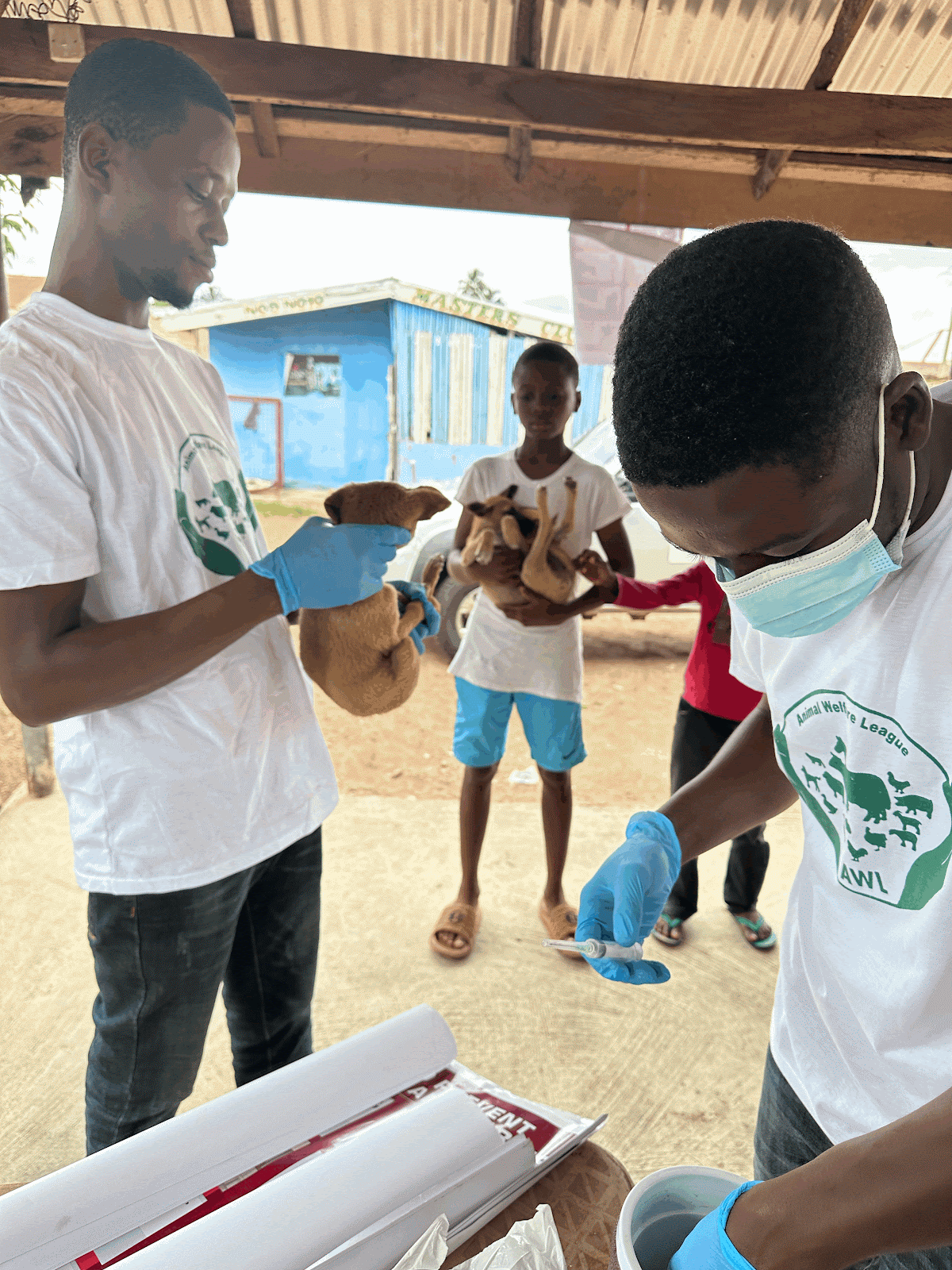
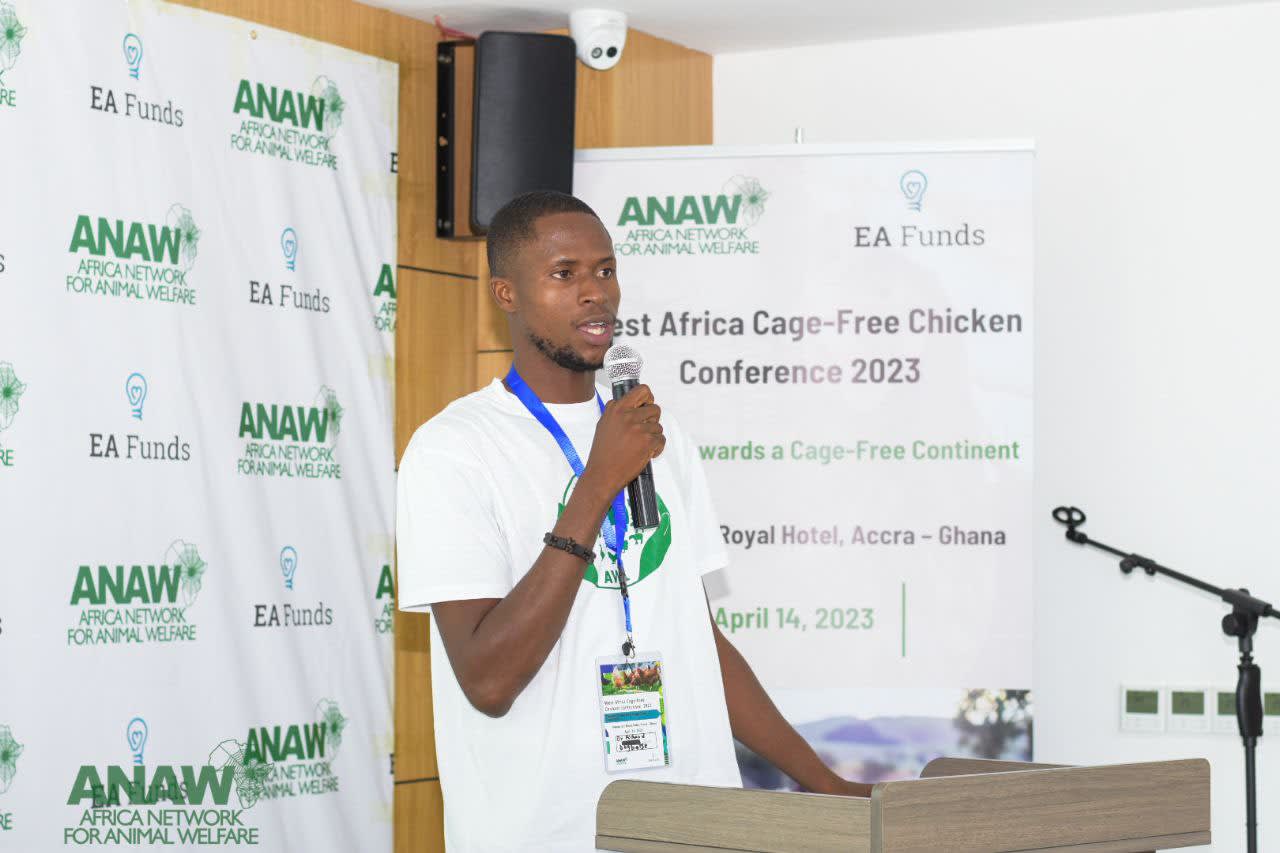

This is an excellent write-up of your work! Thank you for sharing it. And especially, thank you for all you do for animals in Ghana!